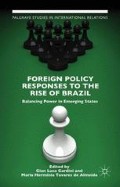Abstract
Brazil has risen. Its international position has never been as central to world affairs, or its global presence as strongly felt, as in the last ten years. Its recently acquired status and recognition as a global player and influential actor are unlikely to recede. The might of its economy, by now the seventh largest in the world in GDP terms (World Bank, 2014), and its international activism have attracted considerable attention from academic, political, and economic analysts (Sweig, 2010; The Economist, 2010; Burges, 2013). However, the limitations of Brazil’s capacity and will to turn its potential power into actual leverage internationally have been identified too. Some have stressed the reluctance of Brazil’s regional partners to follow Brasilia’s policy preferences and agenda (Schirm, 2010; Malamud, 2011). Others have simply omitted Brazil from the list of those likely to shape the world in the 21st century (Kagan, 2008; Russell Mead, 2015). Still others have cast doubt on Brazil’s immediate ability to drive change and promote values globally (Castañeda, 2010). In fact the association of Brazil with concepts such as power or leadership seems to be a contested and complex one, leading some to conclude that Brazil is perhaps a sui generis middle power (Hirst and Soares de Lima, 2006).
Access this chapter
Tax calculation will be finalised at checkout
Purchases are for personal use only
Preview
Unable to display preview. Download preview PDF.
References
Burges, Sean (2013) ‘Brazil as a Bridge between Old and New Powers?’ International Affairs 89(3), 577–594.
Castañeda, Jorge (2010) ‘Not Ready for Prime Time’, Foreign Affairs 89(5), September–October, 109–122.
Cheng-Chwee, Kuik and Lee Kong Chian (2008) ‘Rising Dragon, Crouching Tigers? Comparing the Foreign Policy Responses of Malaysia and Singapore toward a Re-emerging China, 1990–2005’, BiblioAsia 3(4), January, 4–13.
Crandall, Russell (2008) The United States and Latin America after the Cold War, New York: Cambridge University Press.
Flemes, Daniel and Leslie Wehner (2013) ‘Reacciones estratégicas al ascenso de Brasil en Sudamérica’, Foreign Affairs Latinoamérica 13(4), 107–114.
Flemes, Daniel and Leslie Wehner (2015) ‘Drivers of Strategic Contestation: The Case of South America’, International Politics 52(2), 163–177.
Flemes, Daniel and Steven E. Lobell (Guest Editors) (2015) ‘Special Issue: Regional Contestation to Rising Powers’, International Politics 52(2), 139–268.
Gardini, Gian Luca (2010) ‘Proyectos de integración regional sudamericana: hacia una teoría de convergencia regional’, Relaciones Internacionales 15, October, 11–31.
Gardini, Gian Luca (Guest Editor) (2016) ‘Special Issue: Latin American Responses to the Rise of Brazil’, Latin American Research Bulletin, forthcoming 35(1).
Gardini, Gian Luca and Peter W. Lambert (2011) ‘Introduction’, in Gian Luca Gardini and Peter W. Lambert (eds), Latin American Foreign Policies between Ideology and Pragmatism, New York: Palgrave Macmillan, 1–11.
Gomez-Mera, Laura (2014) Power and Regionalism in Latin America. The Politics of MERCOSUR, Notre Dame: Notre Dame Press.
He, Kai (2015) ‘Contested Regional Orders and Institutional Balancing in the Asia Pacific’, International Politics 52(2), 208–222.
Hirst, Monica and Maria Regina Soares de Lima (2006) ‘Brazil as an Intermediate State and Regional Power: Action, Choice and Responsibilities’, International Affairs 82(1), 21–40.
Kacowicz, Arie M. (1998) Zones of Peace in the Third World: South America and West Africa in Comparative Perspective, Albany: State University of New York Press.
Kagan, Robert (2008) The Return of History and the End of Dreams, New York: Alfred A. Knopf.
Kang, David (2007) China Rising: Peace, Power, and Order in East Asia, New York: Columbia University Press.
Lobell, Steven E., Neal G. Jesse, and Kristen P. Williams (2015) ‘Why Do Secondary States Choose to Support, Follow or Challenge?’ International Politics 52(2), 146–162.
Malamud, Andres (2011) ‘A Leader without Followers? The Growing Divergence between the Regional and Global Performance of Brazilian Foreign Policy’, Latin American Politics and Society 53(3), 1–24.
Manners, Ian and Richard G. Whitman (2000) ‘Introduction’, in Ian Manners and Richard G. Whitman (eds), The Foreign Policies of European Union Member States, Manchester and New York: Manchester University Press, 1–16.
Narlikar, Amrita (2010) New Powers. How to Become One and How to Manage Them, Washington, DC: Columbia University Press.
Paul, T. V. (2005) ‘Soft Balancing in the Age of U.S. Primacy’, International Security 30(1), 46–71.
Rouquié, Alain (1998) Amérique latine. Introduction à l’Extrême-Occident, Paris: Points Essais.
Russell Mead, Walter (2015) The Seven Great Powers, The American Interest, 4 January, http://www.the-american-interest.com/2015/01/04/the-seven-great-powers/, date accessed 24 July 2015.
Schirm, Stefan (2010) ‘Leaders in Need of Followers: Emerging Powers in Global Governance’, European Journal of International Relations 16(2), 197–221.
Sweig, Julia E. (2010) ‘A New Global Player. Brazil’s Far-Flung Agenda’, Foreign Affairs 89(6), December, 173–184.
The Economist (2010) ‘Brazil Takes Off’, 14–20 November.
Van Agtmael, Antoine, quoted in De Benedetti, Carlo and Federico Rampini (2008) Centomila Punture di Spillo, Milano: Mondadori.
Walt, Stephen M. (1985) ‘Alliance Formation the Balance of World Power’, International Security 9(4), 3–43.
Waltz, Kenneth (1979) Theory of International Politics, Columbus, OH: McGraw-Hill.
World Bank (2014) Gross Domestic Product 2013, http://databank.worldbank.org/data/download/GDP.pdf, date accessed 6 February 2015.
Editor information
Editors and Affiliations
Copyright information
© 2016 Gian Luca Gardini and Maria Hermínia Tavares de Almeida
About this chapter
Cite this chapter
Gardini, G.L., de Almeida, M.H.T. (2016). Introduction. In: Gardini, G.L., de Almeida, M.H.T. (eds) Foreign Policy Responses to the Rise of Brazil. Palgrave Studies in International Relations Series. Palgrave Macmillan, London. https://doi.org/10.1007/978-1-137-51669-5_1
Download citation
DOI: https://doi.org/10.1007/978-1-137-51669-5_1
Publisher Name: Palgrave Macmillan, London
Print ISBN: 978-1-349-70374-6
Online ISBN: 978-1-137-51669-5
eBook Packages: Political Science and International StudiesPolitical Science and International Studies (R0)

